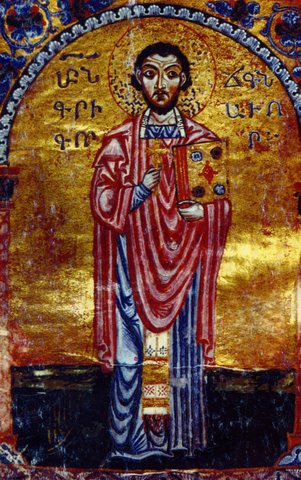
The Armenian monk Gregory Narek (Grigor Narekatsi), whose life spanned the latter half of the 11th century (ca. 950 – 1003), was enrolled amongst the elite Doctors of the Church by Pope Francis in 2015, and soon afterwards placed in the universal liturgical calendar.
His life was externally uneventful, at least in a worldly sense. Raised in a pious household on the shore of Lake Van (now in modern Turkey), as a young man he joined the monastery of Narekavank not far from his home, and spent the rest of his life in prayer, good works, contemplation and, the fruit thereof, his writing. His most famous work, and perhaps the greatest work of Armenian literature, is The Book of Lamentations, a mystical treatise of 95 chapters and 10,000 lines, difficult to put into one category. One may describe it as a theological meditation and introspection, perhaps, along the lines of Augustine’s Confessions. It is said that every household in Armenia once had one – and perhaps still does – to which even miraculous healing properties were ascribed. Many sleep with a copy under their pillows. Certainly, Saint Gregory’s inspiration, and his words, helped the Armenians keep their faith and hope alive in the midst of much pain and suffering in their history, not least the genocide during the First World War at the hands of the Islamic Turks, who also destroyed Narekavank monastery, which had endured for over a thousand years.
Gregory also wrote other works, including a commentary on the Song of Songs – his first treatise as a young man – and numerous homilies, hymns and panegyrics. He held to the doctrine of the perpetual virginity of Mary, the Immaculate Conception, and the Assumption of Our Lady – the latter two defined in the 19th and 20th centuries.
It has been said that Saint Gregory downplayed the need for the institutional Church, emphasizing more the relation of the individual soul to God. I suppose each Doctor has his particular focus – Augustine, of grace, and so on. But Gregory never denied the need for the Church, and was orthodox. As well, at the end of the day, and the end of our lives, the Church was founded as a means to the end of the salvation of each individual soul, created by God for eternal glory – and our own focus on that unfailing promise should help us see our way through these current travails.
Saint Gregory Narek, ora pro nobis!










